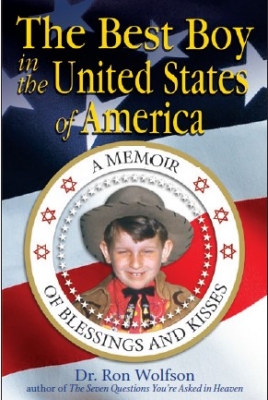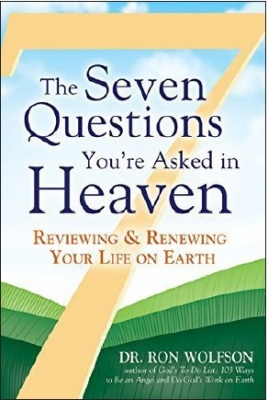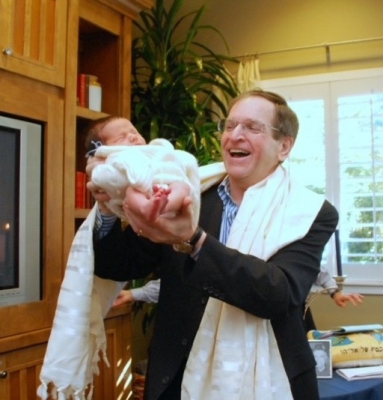Better than Good
Ron Wolfson was sure that he was the best boy in the United States of America. I'm sure he is one of the best men there today. Let me explain.
Ron is a Jewish educator, the Fingerhut Professor of Jewish Education at the American Jewish University in Los Angeles, California. Some years ago he wrote a memoir about growing up Jewish in the small Midwest city of Omaha, Nebraska. The name of the memoir is The Best Boy in the United States of America, the words his Zaide Louie used to call him every time they met. It made no difference that Zadie Louie called all his other grandchildren by the same name - Ron was sure that his grandfather's words applied to him.
I have been reading chapters of Ron's memoir aloud for many years to the residents of the nursing homes where I volunteer. In Bubbie's Candles, one of the earliest chapters in the book, Ron makes the point that no home ritual, even one so evocative as the lighting of the Sabbath candles, can have an impact upon a family unless it is accompanied by warm emotion - in this case his Bubbie's warm kisses. Ron writes that "this is the most important lesson I ever learned - or taught - concerning Jewish family life: it's all about the blessings and the kisses. The rituals without the kisses are empty."
In the chapter called Missing Shabbes, Ron describes his father's sacrifice to be home every Friday night for the family meal. It was expected of everyone in the family to be at that meal but one Friday night the teen-aged Ron chose to be with his friends at the mall instead. Disappointed, Ron's father, who was not an especially religious man, explained to Ron why it was so important to him to be home on Friday night: "So I can be with your mother and my boys for a meal, a meal that isn't rushed, a meal that's taken at the dining room table, not in front of the TV...because it's our family time." Ron writes that he has never missed another Shabbat dinner - to this day.
The chapter called Mrs. B, the Furniture Queen, describes the remarkable Rose Blumken, who came to America from Russia at the age of 24 and built up the Nebraska Furniture Mart, the largest retailer of furniture in the Midwest. Although there is no explicitly Jewish moral in this chapter it's just too funny to skip over. Her business caught the eye of Warren Buffet, also an Omaha resident, and one of America's richest men. Mr. Buffet made Rose an offer she couldn't refuse and bought her business. But, unhappy in retirement, the indefatigable and irrepressible Mrs. B., now 84 years old, opened a new place of business called Mrs. B's Warehouse, and the new business was giving Mr. Buffet a run for his money. Five years later, Mr. Buffet bought that business too and wrote to his stockholders: "This time around Mrs. B. graciously offered to sign a non-compete agreement - and I, having been incautious on this point when she was 84, snapped at the deal. Mrs. B belongs in the Guinness Book of World Records on many counts. Signing a non-compete at 89 merely adds one more."
So, imagine my surprise when one day out of the clear blue sky I received an email from Ron Wolfson himself! He had met my son Dan, also a Jewish educator, at an on-line conference on Jewish studies. "Hello, Eli," the email began, "Ron Wolfson here to say hello....Dan mentioned to me that you enjoyed my memoir The Best Boy in the United States of America....May I send you a more recent book of mine that you may like?"
A few days later the book arrived. Called The Seven Questions You're Asked in Heaven, the book is a guide, based on Jewish wisdom, on how we should live our lives on earth. Ron's warm voice is found on every page. And every once in a while he makes reference to the Jewish lessons he learned growing up in Omaha.
I wrote Ron thanking him for the book and told him how much I enjoyed it. Ron wrote me back that he was very pleased, and added that the last year had been a difficult one. His wife Susie underwent a kidney transplant operation and there were complications. She spent many months in the hospital before being allowed to go home. During that time, and amidst all the worry and uncertainty, Ron came to a conclusion: just as Susie received a life-saving kidney from a donor she did not know, so would he donate one of his kidneys to a recipient he did not know.
I can only imagine how Ron came to that decision, but I suspect that his lifelong study of Jewish wisdom had much to do with it. In his own words: For centuries, the debate has raged: what is more important - doing good deeds or studying Torah. In Pirkei Avot, the Ethics of the Fathers (3:22), Rabbi Elazar ben Azariah seems to argue for good deeds. In the Talmud (Shabbat 127a), however, a different answer seems to be given: Talmud Torah k'neged kulam, the study of Torah is equal to everything. But really, there is no contradiction at all for it is through the study of Torah that one is led to the performance of good deeds. The purpose of the study of Torah, therefore, is the performance of good deeds.
I wrote Ron one more time. I told him that knowing myself as I do, I just don't think I could have done what he had done. I didn't spell it out in so many words, but I hinted that the best boy in the United States of America, through his learning, through his teaching, and through all his good deeds, had become one of its best men.











Comments